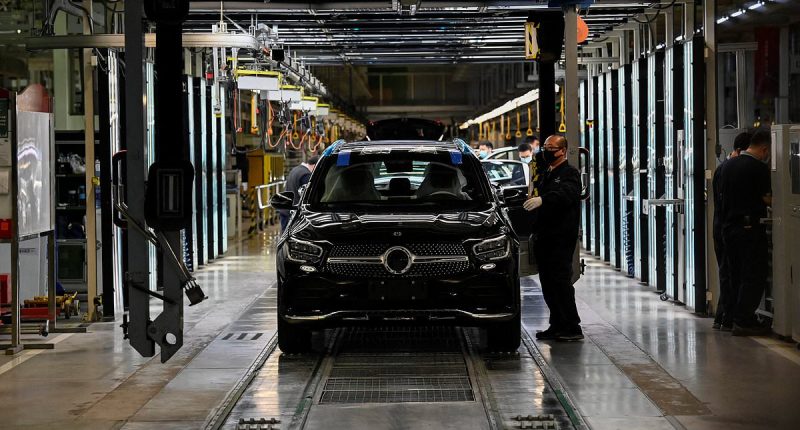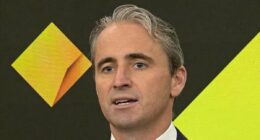Share this @internewscast.com
Mercedes-Benz will shift production of one of its vehicles to Tuscaloosa, Alabama by 2027.
The German luxury carmaker’s action represents the latest response from an industry facing the costly effects of President Donald Trump’s 25 percent tariffs.
This decision signifies a possible victory for Trump’s protectionist trade strategy, which seeks to enhance US manufacturing by imposing high tariffs on foreign-made products.
But there are many complicating factors.
The company didn’t say which model would move to America. Instead, it said the production of a ‘core segment vehicle’ will move stateside.
Numerous experts foresee that this move will affect the production of the GLC, the company’s top-selling vehicle in the US. The compact SUV is manufactured in Bremen, Germany.
‘As a company with global activities and more than 30 plants worldwide, Mercedes-Benz generally pursues a local-for-local strategy,’ the company told DailyMail.com.
‘In doing so, we continuously optimize our production network and use its high flexibility to react to fluctuations and changing market conditions to remain competitive.’

Alabama employees might soon start making America’s best-selling Mercedes
Mercedes reported selling 64,163 units in the US in 2024, up 58 percent from the year before.
While the Alabama plant might become the SUV’s birthplace, Mercedes will likely start to move some production out of the factory, too.
The company said in April it was actively reviewing production moves as the tariff pressure mounted.
Moves could impact some of its highest-profit cars, like the GLE, GLS, GLE Coupe and Mercedes-Maybach GLS, which all call Alabama home.
Mercedes has used the American plant for export production, including sending cars to Europe and Canada.
But as President Trump doubles down on automotive tariffs and countries respond with retaliations, exported vehicles could be slashed from the factory lines.
It’s a risk Trump is willing to take. For years, the President has argued that high import taxes will entice companies to reboot a sleepy manufacturing sector in the US.
So far in the auto industry, his duties have had mixed results.

Experts predict Mercedes-Benz’s GLC could soon be produced in the US

Mercedes-Benz has been building cars in its Alabama plant since 1997

Sten Ola Källenius, the CEO of the German luxury brand, has been reassessing the company’s production portfolio
Yesterday, GM’s CEO, Mary Barra said that tariffs will cost her company between $4 billion and $5 billion annually.
Her company’s statement was the first time consumers could see the genuine cost the Trump administration might be imposing on car companies.
Ford has responded with an employee pricing sale that has slashed thousands off its current lineup.
But the company’s CEO, Jim Farley, has admitted that prices for his cars are likely to rise after July 4.
Honda and Hyundai have both said they’re re-upping plans to manufacture cars in the US to avoid tariffs.
Meanwhile, Stellantis laid off 900 employees and blamed tariffs.
Subaru also said it would stop shipping cars to Canada from its Indiana plant.
So far, the companies have scribbled out minor details of their capacity changes. But behind the scenes, executives are growing increasingly frustrated with the White House’s ever-shifting policies.
Executives told DailyMail.com that they’re struggling to even set a price for their products.
















